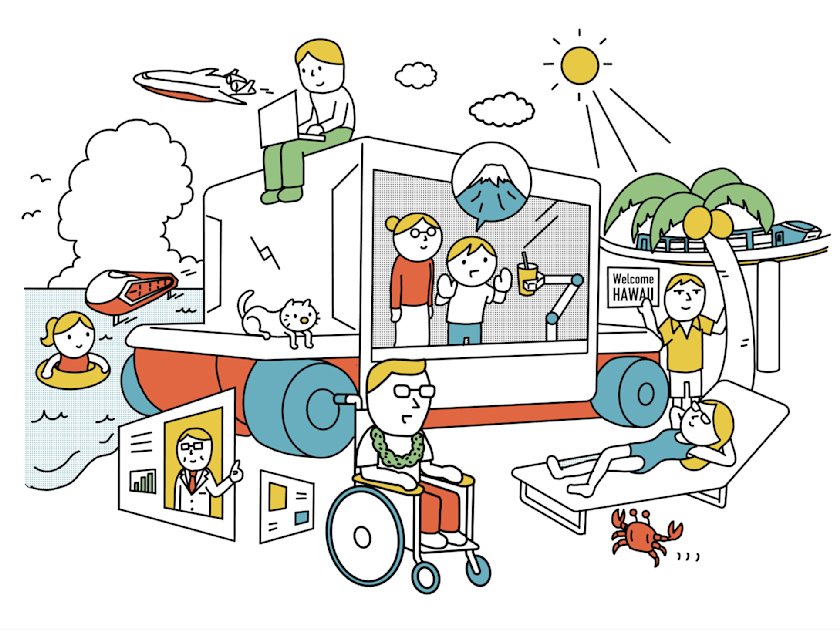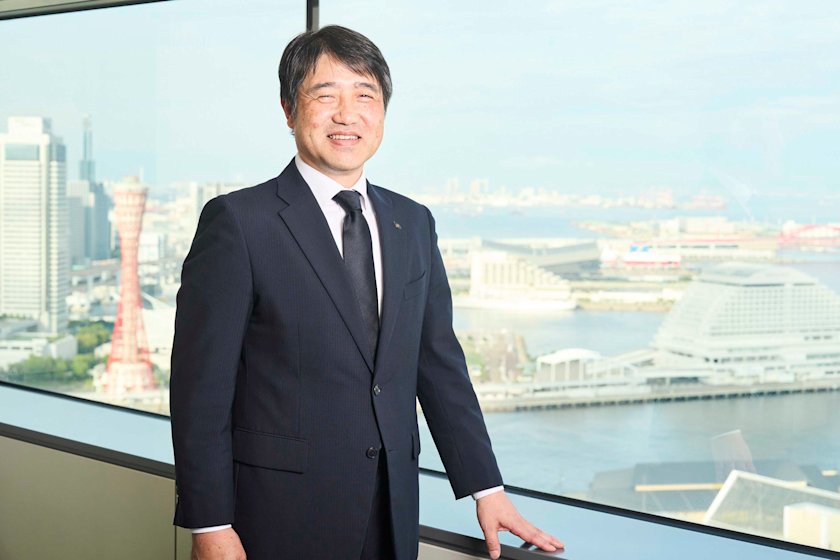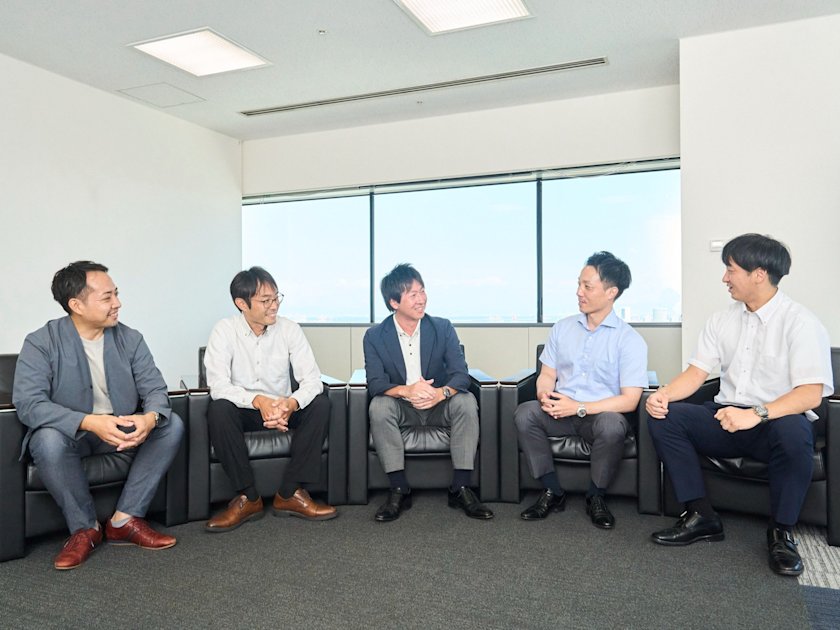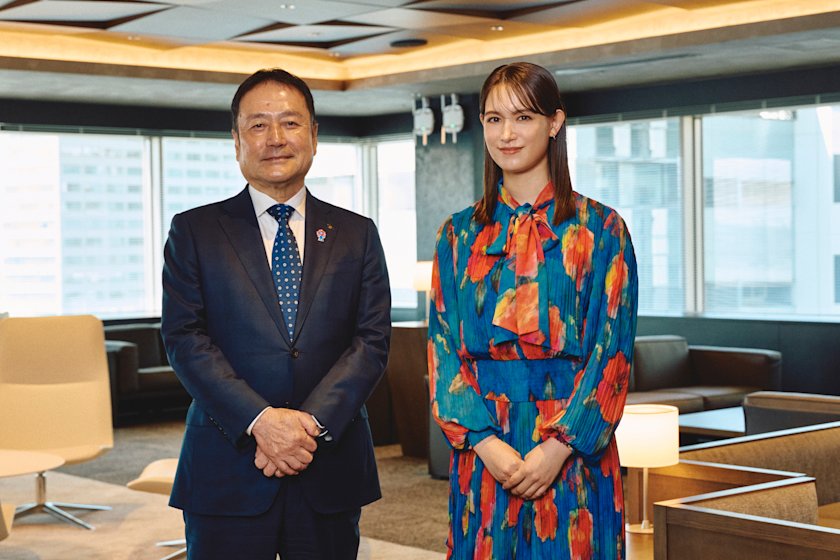Diversity and inclusion (D&I) is a topic that is increasingly relevant to both companies and employees. While based on the same basic concept, the measures and the thoughts behind them vary from company to company. In this article, we discuss the initiatives Kawasaki has taken to date and the unique challenges it faces as a heavy equipment manufacturer, as experienced by the Diversity and Inclusion Promotive Section.
What is diversity and inclusion?
Diversity and inclusion (D&I) is about empowering people by respecting and appreciating each individual’s uniqueness within an organization or group.
It is important to understand that it is not just about the presence of diverse people; the concept also entails establishing systems and mechanisms to enable diverse people to demonstrate their abilities fully, and fostering a culture that supports this. A workplace where everyone can work to their potential leads to increased motivation and productivity for each individual and, in turn, becomes an engine for a company to change and evolve.
Kawasaki, which currently has a high proportion of male employees, has generally been seen as lagging behind in D&I. However, the company established its Diversity and Inclusion Promotive Section back in fiscal year2010 and has continued to challenge itself to create change.
Connecting across different boundaries leads to growth
The initial primary theme of the Diversity and Inclusion Promotive Section, a team that is tasked to drive D&I within Kawasaki, was to empower women in the workforce, says Mr. Shin.

To better empower women, we implemented the necessary systems and mechanisms, as well as training, designed especially for those balancing work and childcare. We initially focused on women’s empowerment, but as we worked on it, we became aware of new challenges and targets.
Kawasaki has a high proportion of male employees, with a men-to-women ratio of 9 to 1. Even among the men, however, there are a variety of personalities and values, and a wealth of diversity. In order to make the best of everyone’s abilities, we are currently actively working on the following D&I themes:
1) Empowerment of women in the workplace
2) Support for balancing work with childcare, caregiving, and medical care
3) Employment of people with disabilities and the elderly
4) Establishment of systems and work environments that are welcoming for members of the LGBTQ+ community
5) Employment of non-Japanese nationals
D&I is also very important in terms of alignment with the “Cross Over” concept that Kawasaki has set forth in its Group Vision 2030, Shin emphasizes.

As one of the keywords in our Group Vision 2030, we have set forth the concept of “Cross Over.” Our goal is to be a company that provides “Trustworthy Solutions” for society and for the next generation. To achieve this, we must focus on common big-picture goals, shift away from the siloed culture within our Group, and go beyond the boundaries of attributes, personality, specialization, and ability to take on new challenges. This is precisely the same concept as D&I.
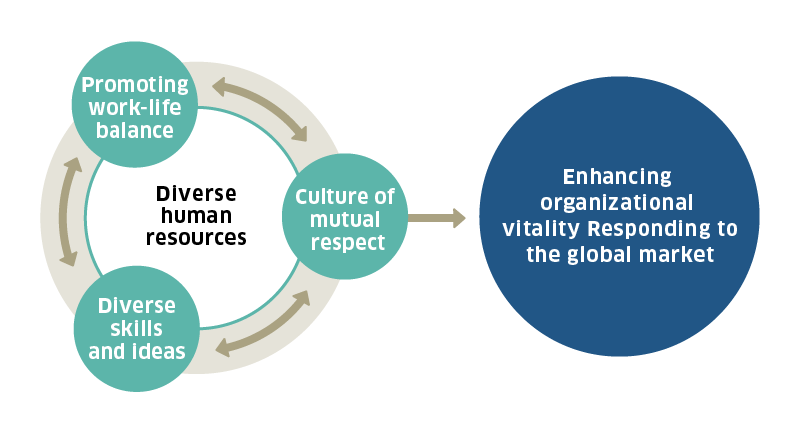
Kawasaki’s Challenge (1) — Encouraging male employees to participate in parenting, which benefits everyone��’s ability to work
Here are three representative examples of the specific D&I initiatives at Kawasaki.
First, Kawasaki is working to promote male parental involvement. This is not only to improve workability for male employees and their quality of life, but also to make it easier for female employees who are balancing work and childcare. As male employees become more involved in parenting, their understanding of female employees with children will also deepen.

In addition to regularly holding seminars with external lecturers, Kawasaki is also working to expand programs, such as subsidizing babysitter fees. Currently, the average number of days of paternity leave taken by male employees in the Group is 71 days, which is nearly twice the national average in Japan.
We spoke with Megumi Maenosono, a seminar lecturer at Kawasaki, about the company’s efforts to promote male parental leave.
Creating a system allowing teams to achieve results helps employees feel more comfortable about using benefits
Among Kawasaki’s childcare leave support programs, I feel that the most noteworthy are the Nursery School Enrollment Concierge* and Kawasaki Childcare Rescue System,* which support employees in working or returning to work. The Nursery School Enrollment Concierge is especially useful for those having their first child, who are experiencing child-rearing for the first time. It is helpful to have professional staff available for consultation when new parents are feeling mentally or physically worn out. As for the Kawasaki Childcare Rescue System, I expect that it will lower the hurdles to using a babysitter and encourage couples to rely on private services when they are having a hard time. In addition, my impression is that many people at Kawasaki, both women and men, feel that the workplace is understanding and cooperative when it comes to taking childcare leave. I also heard many positive comments from managers, such as that not only women but also men should take childcare leave.
On the other hand, even if there is a system in place and there is understanding in the workplace, there are many people who do not take full advantage of the support, thinking they do not want to be a burden or bother to their fellow employees, or that no one else will be able to perform the specialized tasks they do, while they are on leave. There are many managers who have concerns about organizational management from this perspective. By revising the way we work and shifting to a way of working that allows everyone to produce results in a limited amount of time, and by having a system in place that allows teams to produce results even when there are people on leave, we will be able to build a system that allows those who need these systems to use them comfortably when needed.
*Nursery School Enrollment Concierge: Provides services to help employees taking childcare leave enroll their children in a nursery school.
*Kawasaki Childcare Rescue System: Subsidizes the cost of babysitting services provided by childcare providers designated by the company to cater to sickness or recuperation of children, as well as business trips and overtime work.
What employees are saying about company policies to support parental involvement by fathers
Voice of a male employee who has taken parental leave
“The transition from work to parental leave and back was smooth. I found the meetings I had with my manager and colleagues before and after my leave very helpful. I was able to return to work without any gaps. While the number of those taking parental leave is increasing, I have heard that it isn’t always so easy, depending on the department. I hope that the company will make it easier for all employees to take advantage of this important benefit in a fair manner.”
Voice of a female employee working in a department with a high number of male employees
“The company has revised its policies to allow for flexible working arrangements for childcare and caregiving, such as allowing shortened working hours, the abolition of core hours, and the ability to take accumulated leave in hourly increments. Male employees are also not holding off on taking leave or working remotely for childcare reasons, and there is a culture of respect for employees’ home lives throughout the organization.”
Kawasaki’s Challenge (2) — Growing the number of LGBTQ+ ally program supporters
Next, we have been focusing in recent years on measures for the LGBTQ+ community. We have taken two main approaches, one to support LGBTQ+ employees and another for all employees, including LGBTQ+ employees.
For LGBTQ+ employees, we have developed systems for their specific use. We have introduced a same-sex partner registration system and a business name system, which allows employees to use a chosen name.
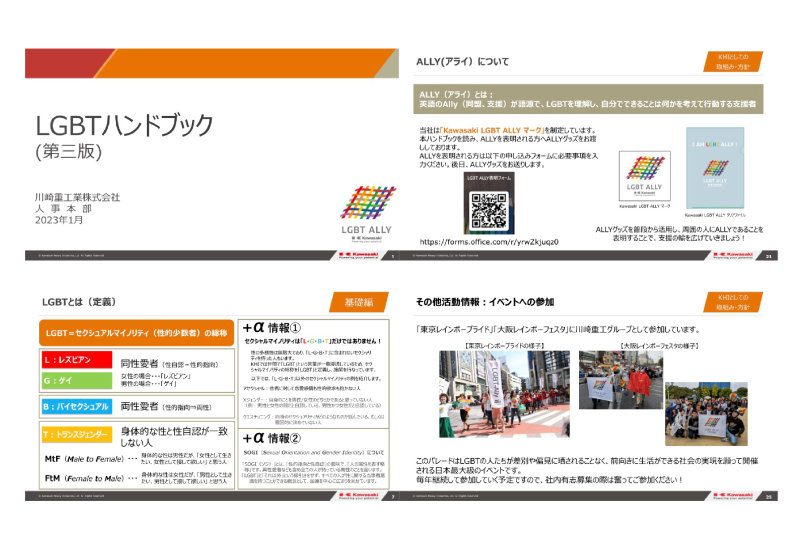
For all employees, we are making sure that everyone has basic knowledge of LGBTQ+ issues by providing a handbook and holding seminars.
In addition to raising awareness, we have created the Kawasaki LGBT Ally mark, which employees can wear to demonstrate their understanding and support, and we are also working to distribute ally goods to supporters. Employees who have learned the basics about LGBTQ+ issues can identify themselves as allies within the company.
Currently, the number of allies is approximately 1,100 people. Making the ally program visible is leading to improvements in the workplace environment and fostering peace of mind for LGBTQ+ people.
In addition, outside the company, we have participated in Pride events in Tokyo and Osaka. In 2003, the company also distributed approximately 15,000 LGBT Ally paper fans to people attending matches of Vissel Kobe, a Japanese professional football club Kawasaki sponsors, and at our Kawasaki Good Times World, a company museum, introducing Kawasaki’s activities and raising awareness.
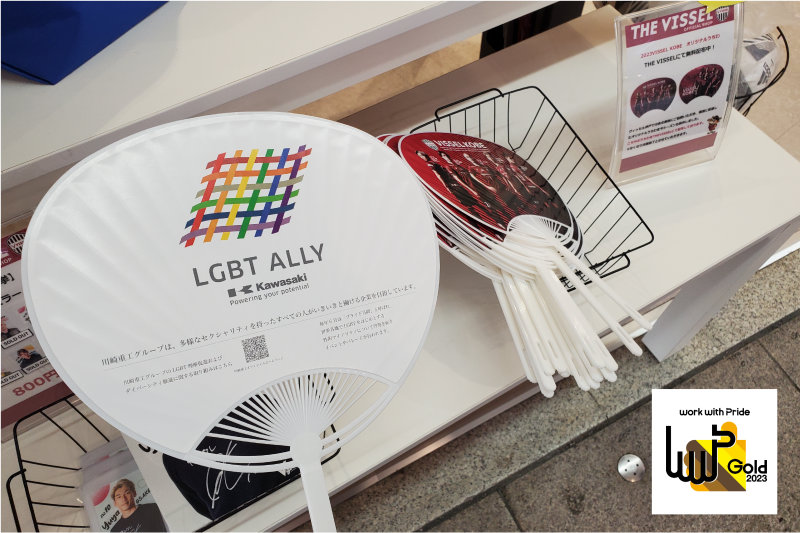
As a result of these efforts, Kawasaki has received the highest rating of Gold in the Pride index for the sixth consecutive year. The Pride index is an evaluation index for initiatives related to LGBTQ+ issues.
What employees are saying about the ally program
Appreciation that LGBTQ+ awareness within the company has grown
“Understanding of LGBTQ+ issues is spreading, and I feel that awareness is increasing even in conversations at the workplace. For example, some female employees have changed from wearing skirts as a uniform to wearing pants, and I think this is also an example of eradicating bias.”
Areas Kawasaki still has room to grow in order to further foster a culture of understanding of LGBTQ+ people
“I want to increase the number of allies at production sites. I think it would be effective to involve current allies and diversify the merchandise. Stickers help attract interest at production sites, so I make sure to accompany them with explanations when implementing these tools.”
Kawasaki’s Challenge (3) — Diversity within reach: Seminar on thinking about diversity
The last example is “Thinking About Diversity,” a voluntary seminar held since fiscal year2020 for all who wish to attend. The seminar covers a variety of topics, such as LGBTQ+ issues, unconscious bias, disability inclusion, and work-life balance. External lecturers and people with actual experience are invited to speak.
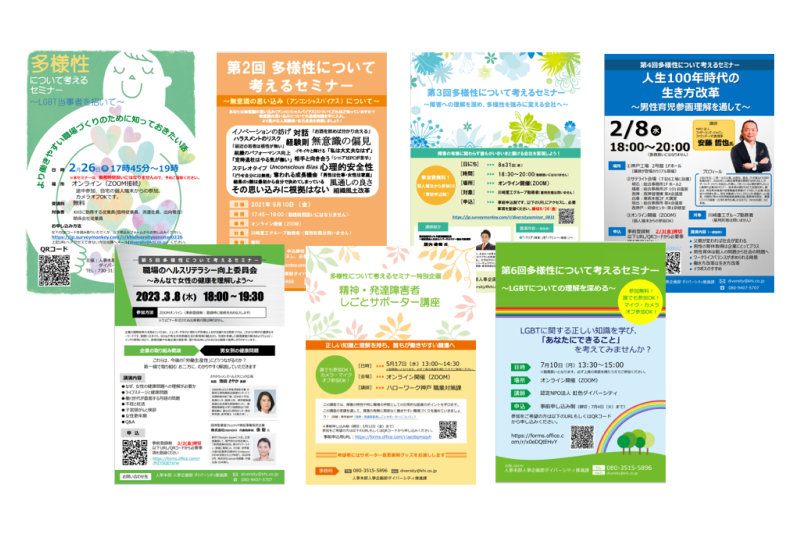
As it is generally held online and after regular business hours, employees can participate from home after work. The participant satisfaction level has been high, and we will continue to create opportunities for people to become more familiar with various themes related to diversity and spread awareness of D&I.
Steady, small results become big changes
Kawasaki is taking various steps to work on D&I. Mr. Shin stated that he has noticed a steady change in the reaction within the company.


In addition to the increase in the number of participants in the LGBTQ+ Ally Program and the Pride events, the number of days of paternity leave taken by men is twice the national average. There are also changes that the numbers do not show. For example, employees are starting to say things like, “I’m glad I took paternity leave,” and “It’s easier for me to take leave if others are taking it.” This and other comments indicate that there have been positive impacts not only on the thinking of those taking paternity leave but also on that of their supervisors.
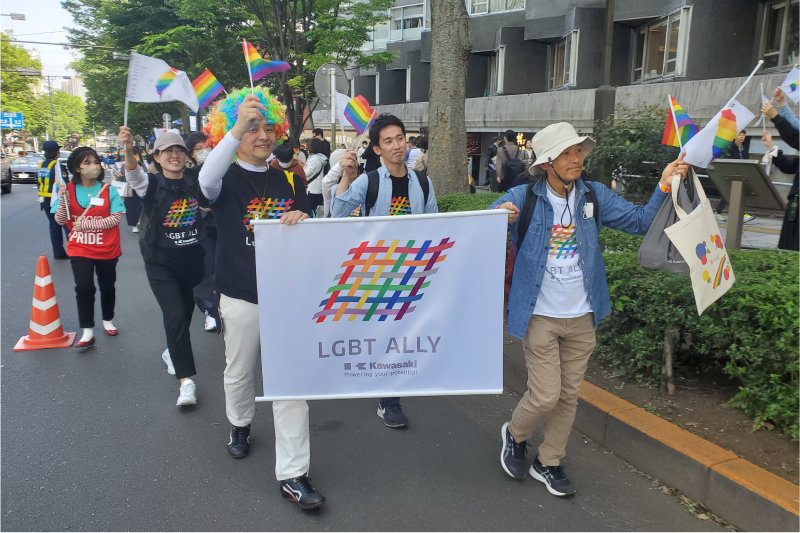
Changing corporate culture and values requires a long-term perspective and continuous effort. While steady efforts are yielding results, there are still challenges ahead, says Mr. Shin.

Increasing understanding of diversity in the production workplace is a major theme. While the production sites of heavy industry manufacturers in Japan are still male-dominated, the number of women assigned to these sites and the number of men taking paternity leave have been increasing recently, making it essential to further increase understanding.
In this context, we have been conducting diversity training for new employees assigned to the production sites since fiscal year 2023. We also plan to conduct training for their supervisors in the near future.
Changing a male-dominated industry
Our industry is still male-dominated. In addition, we need to advance our efforts for people of various backgrounds, including non-Japanese nationals, people with disabilities, and people who are caring for family members. We are continuing to work to change this situation, and D&I is definitely spreading.
In order to continue to deliver “Trustworthy Solutions for the Future,” Kawasaki is committed to becoming a company where everyone can thrive.

Human Resources Planning Dept.
Human Resources Div.
Head Office
Kawasaki Heavy Industries, Ltd.

Japan Institute for Women’s Empowerment & Diversity Management
Representative
DII Management Support

